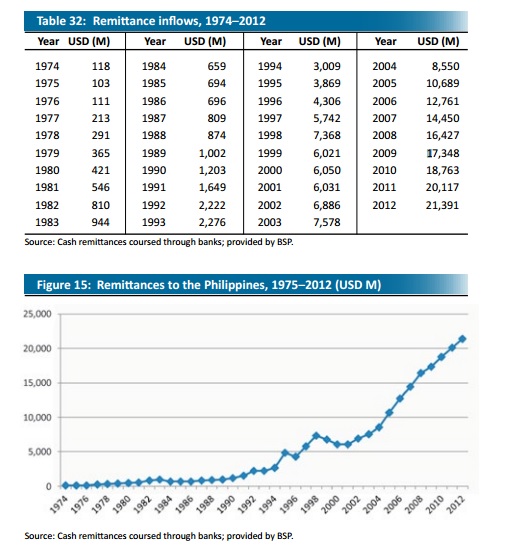


| Capital: Manila | Adult HIV Prevalence (2007): <0.1% |
| Area:796,095 sq km | Emigrants: N/A |
| Population (2010): 93.6 million | Immigrants(2010): 0.5% |
| GDP per Capita PPP (2007): USD 3,406 | Net Migration Rate: (2005 – 2010)2.0 migrants /1,000 population |
| HDI Rank (2007): 105 of 182 | Remittances (2008): USD 18,643 million |
| Languages: Pilipino, English | Women as a Percentage of Immigrants (2010):51.1% |
| Currency: Philippine Peso (PHP) | International Migrant stock: N/A |
| Population under 15 (2010): 33.4% |
The Philippines is one of the major origin countries of migrants in Asia with over a million workers being deployed each year to more than 200 countries and territories. According to the official record, 1,236,013 workers were deployed overseas in 2008. Over 8 million Filipinos are currently living and working abroad.
Comprehensive Legislative Framework
Philippines leans on a solid legal foundation in managing labour migration through the following legislations: Labor Code of the Philippines; Migrant Workers & Overseas Filipinos Act of 199f (Republic Act 8042 as amended by Republic Act 10022); POEA Rules and Regulations Governing the Recruitment and Employment of Land based Overseas Workers/Seafarers.
Multi-sector Representation in Policy Making Bodies
The migrant workers – land based, seafarer and women workers – are represented in the Governing Board of the POEA as well as in the Board of Trustees of the OWWA. These are policy making bodies of the key institutions managing overseas employment.
Joint and Several Liability of Recruitment Agency with their principal
A licensed recruitment agency assumes joint and several liability (JSL) with their foreign principal or foreign employer, in virtue of the law on agency. This JSL empowers an aggrieved migrant worker with an option to file a case in Philippine courts should a case fail to prosper through the court system of the destination country or the foreign employer does not cooperate to address the complaint of he worker.
Philippine Overseas Labor Offices & Filipino Workers Resource Center
The Philippines maintains the presence of the Philippine Overseas Labor Offices or POLO’s as well as the Filipino Workers Resource Centers (FWRC) in some 35 major destinations of Filipino workers to ensure the provision of onsite assistance and welfare services. These facilities are co-funded from the OWWA Welfare Fund programme and annual government budget appropriations.
Services at Pre-employment/Pre-departure, Post Arrival and Return
Various services are provided at every stage of the migration cycle which includes pre-employment & pre-departure orientation, skills registration, government placement assistance, onsite welfare assistance, skill & entrepreneurial training, and reintegration assistance.
Crisis and Displacement Assistance
A number of special funds, other than the membership-based Welfare fund, is appropriated by government as follows: Legal Assistance Fund (to cover legal counsel and representation costs in foreign courts) and Emergency Repatriation Fund. Along with the mandatory insurance covering migrant workers and the liability of foreign employers to assume the cost of repatriation during times of crisis and emergency, the Repatriation Fund is a resource recourse made available especially in times of the need for mass repatriation. A special displacement assistance grant is also made available by the National Reintegration Center for OFWs.
Awards & Incentives
Good performing recruitment agencies and foreign employers are recognized in their respective award system for integrity, exemplary performance and migrant-friendly operations. Likewise migrant workers and their families are recognized for excellence, showcase of heroic deeds, national pride and exemplary values. This award system serves to inspire the others.
Republic Act 8042 otherwise known as the Migrant Workers and Overseas Filipinos Act of 1995, as amended by Republic Act 10022; POEA Rules and Regulations, both for landbased and seabased workers
Department of Labour and Employment
Supply Response of Filipino Workers to World Demand
This study summarizes the historical development and on-going initiatives of the public and private sectors in the Philippines on skills development and certification process in preparing its citizens for overseas employment especially in the area of nursing and seafarers. The study explains how the Philippines has successfully introduced and excelled in pertaining internationally recognizable skills to their workers to meet the global demand.
Based on the author’s findings a number of factors have contributed to the Philippines ability to address the world demand for labour; factors such as an Education Training system that produces qualified middle-skilled workers, an organized recruitment industry, and government institutions which facilitate migration, protects migrant workers and promotes new markets through trade agreements. With labour migration projected by the study to continue, the Philippines’ experience on the topic will be of great interest to other migrant origin countries which strive to upgrade the skills level of migrant workers.




















